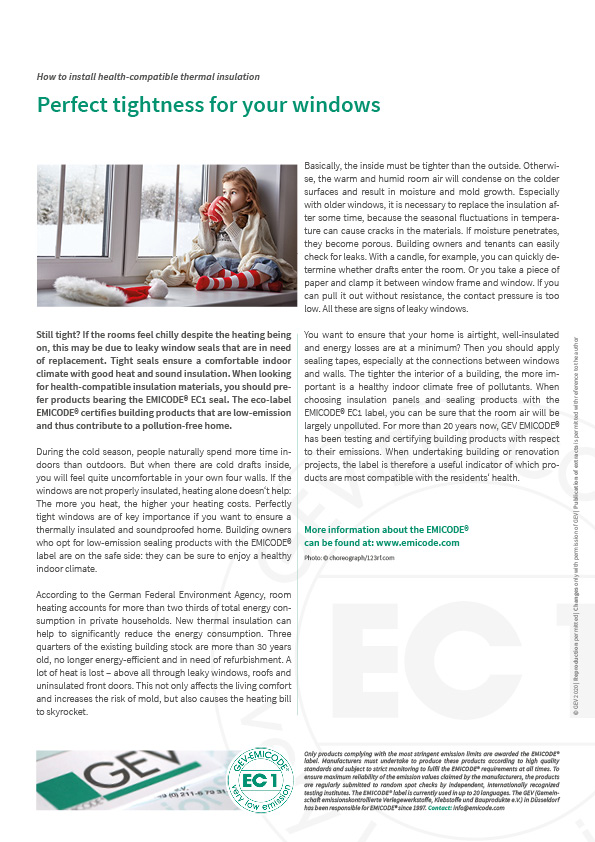Perfect tightness for your windows
How to install health-compatible thermal insulation
During the cold season, people naturally spend more time indoors than outdoors. But when there are cold drafts inside, you will feel quite uncomfortable in your own four walls. If the windows are not properly insulated, heating alone doesn’t help: The more you heat, the higher your heating costs. Perfectly tight windows are of key importance if you want to ensure a thermally insulated and soundproofed home. Building owners who opt for low-emission sealing products with the EMICODE® label are on the safe side: they can be sure to enjoy a healthy indoor climate.
According to the German Federal Environment Agency, room heating accounts for more than two thirds of total energy consumption in private households. New thermal insulation can help to significantly reduce the energy consumption. Three quarters of the existing building stock are more than 30 years old, no longer energy-efficient and in need of refurbishment. A lot of heat is lost – above all through leaky windows, roofs and uninsulated front doors. This not only affects the living comfort and increases the risk of mold, but also causes the heating bill to skyrocket.
Basically, the inside must be tighter than the outside. Otherwise, the warm and humid room air will condense on the colder surfaces and result in moisture and mold growth. Especially with older windows, it is necessary to replace the insulation after some time, because the seasonal fluctuations in temperature can cause cracks in the materials. If moisture penetrates, they become porous. Building owners and tenants can easily check for leaks. With a candle, for example, you can quickly determine whether drafts enter the room. Or you take a piece of paper and clamp it between window frame and window. If you can pull it out without resistance, the contact pressure is too low. All these are signs of leaky windows.
You want to ensure that your home is airtight, well-insulated and energy losses are at a minimum? Then you should apply sealing tapes, especially at the connections between windows and walls. The tighter the interior of a building, the more important is a healthy indoor climate free of pollutants. When choosing insulation panels and sealing products with the EMICODE® EC1 label, you can be sure that the room air will be largely unpolluted. For more than 20 years now, GEV EMICODE® has been testing and certifying building products with respect to their emissions. When undertaking building or renovation projects, the label is therefore a useful indicator of which products are most compatible with the residents’ health.

Photo: @choreograph/123rf.com
Still tight? If the rooms feel chilly despite the heating being on, this may be due to leaky window seals that are in need of replacement. Tight seals ensure a comfortable indoor climate with good heat and sound insulation. When looking for health-compatible insulation materials, you should prefer products bearing the EMICODE® EC1 seal. The eco-label EMICODE® certifies building products that are low-emission and thus contribute to a pollution-free home.

Do You Have Questions?
If you have questions about specific topics or if you would like to contact us for any other reason, feel free to contact us by phone, fax or e‑mail.
Phone: +49 211 / 67931–20
Fax: +49 211 / 67931–33
info@emicode.com
Share article on Social Media:
